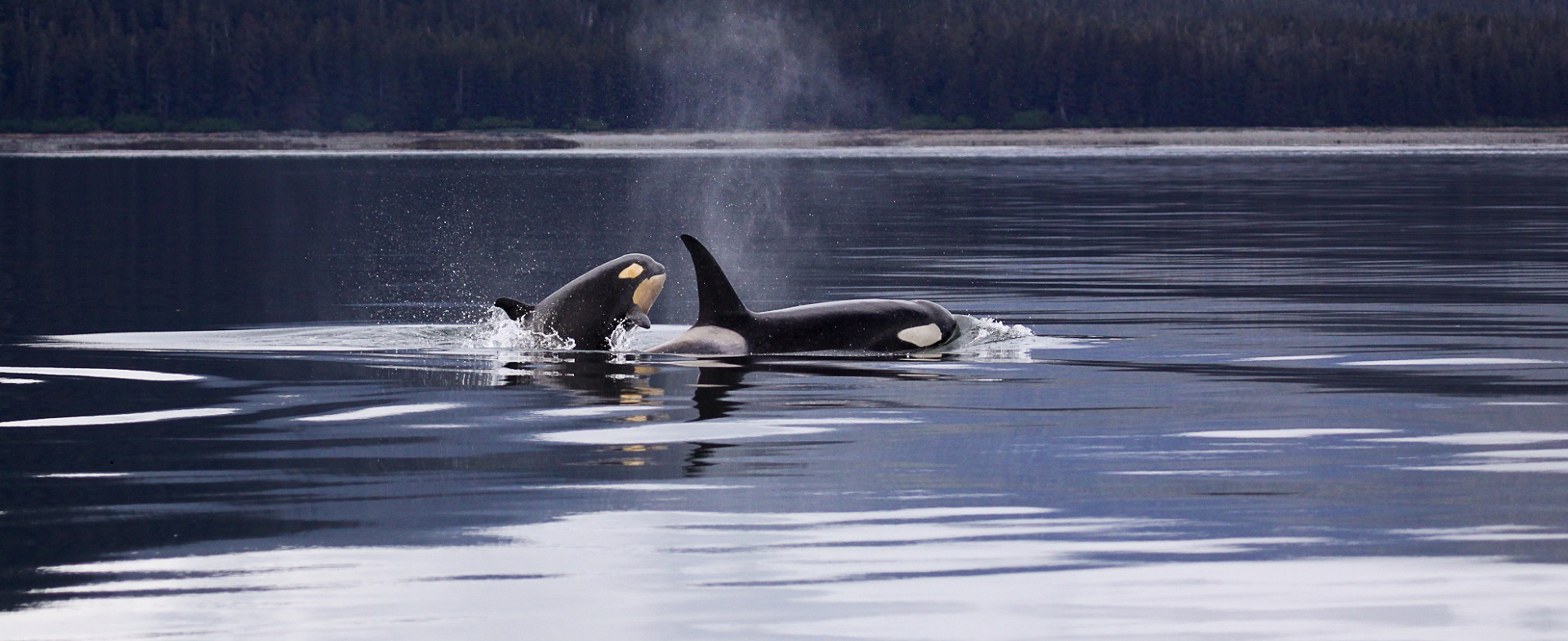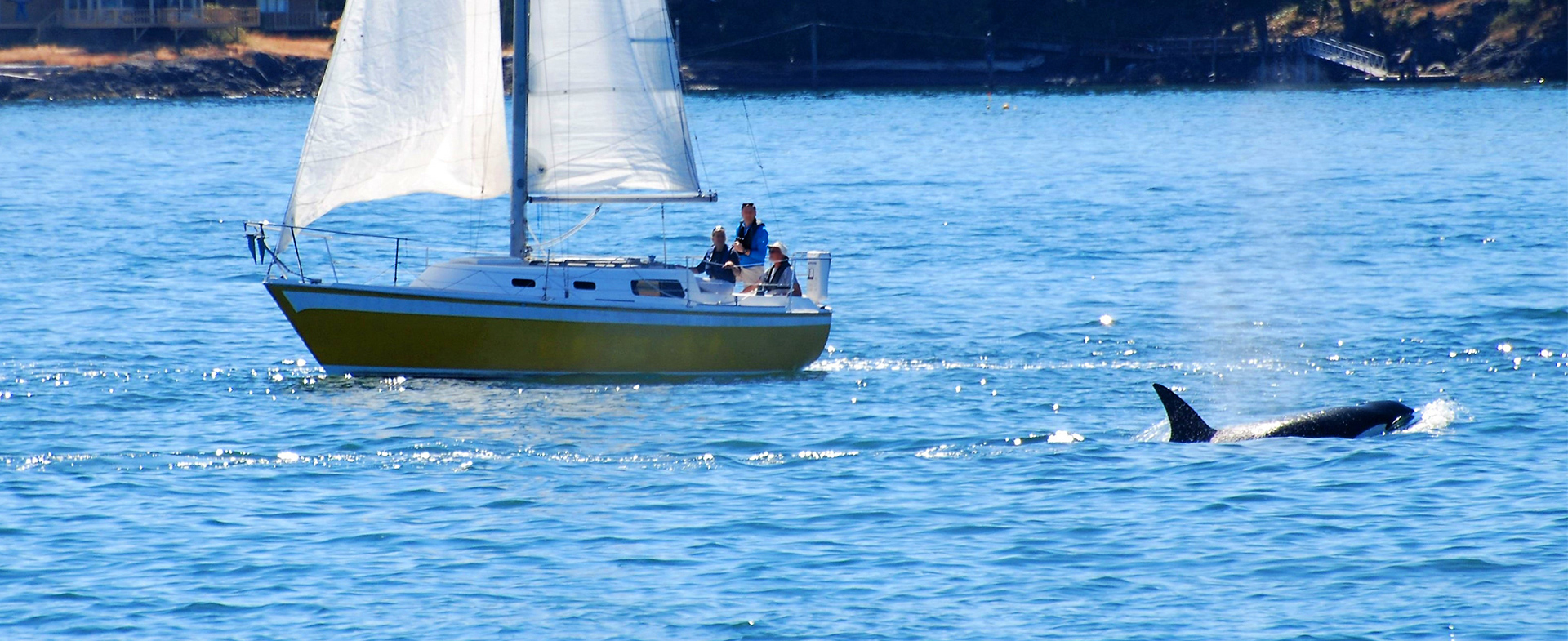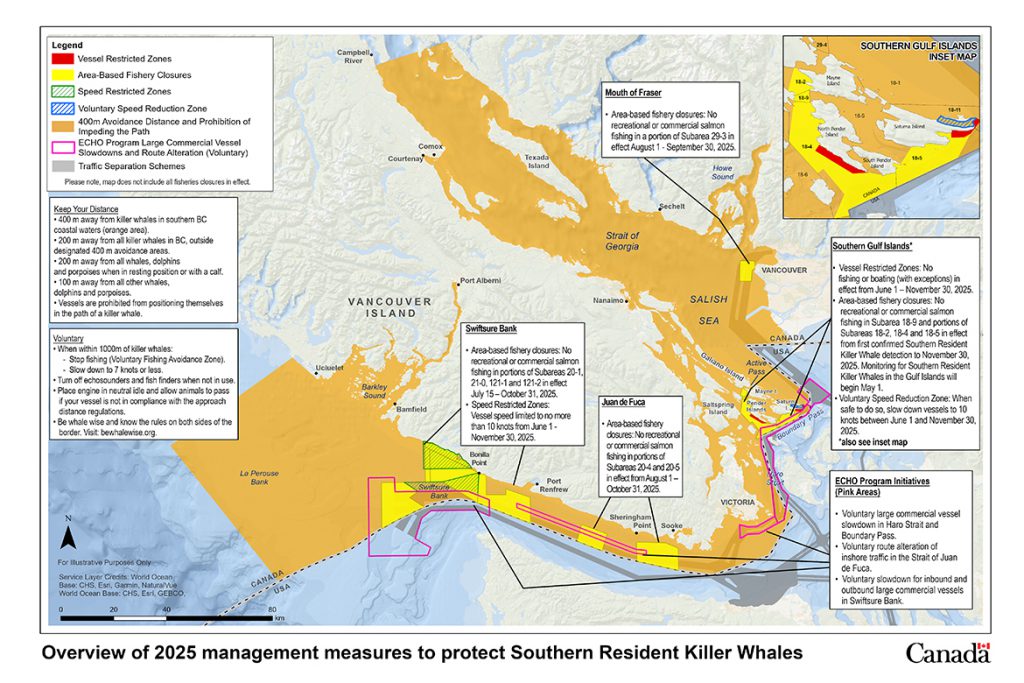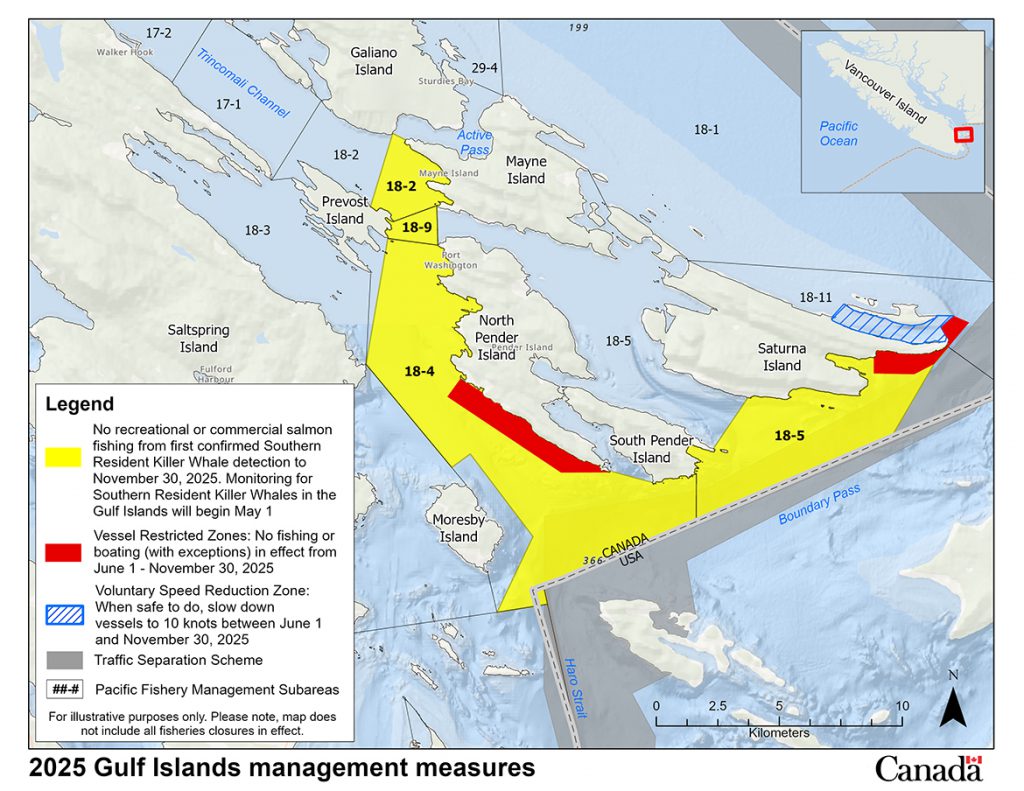Act Responsibly
Be Whale Wise is a partnership of county, state and federal governments, researchers, non-profits, and other stakeholders working together to provide information and education on the regulations and guidelines for marine wildlife. Be Whale Wise is a resource for boaters, educators, and anyone passionate about learning how to protect the marine environment of the Salish Sea.
The Salish Sea is home to many marine mammals, including the iconic and endangered Southern Resident killer whales (SRKWs). This unique population of killer whales feeds on fish and lives in close family groups. Southern Resident killer whales are listed as endangered in both Canada and the United States. Only 73 orcas remain as of July 2024. One of the best ways to help these whales, and other marine wildlife in the Salish Sea, is to Be Whale Wise!
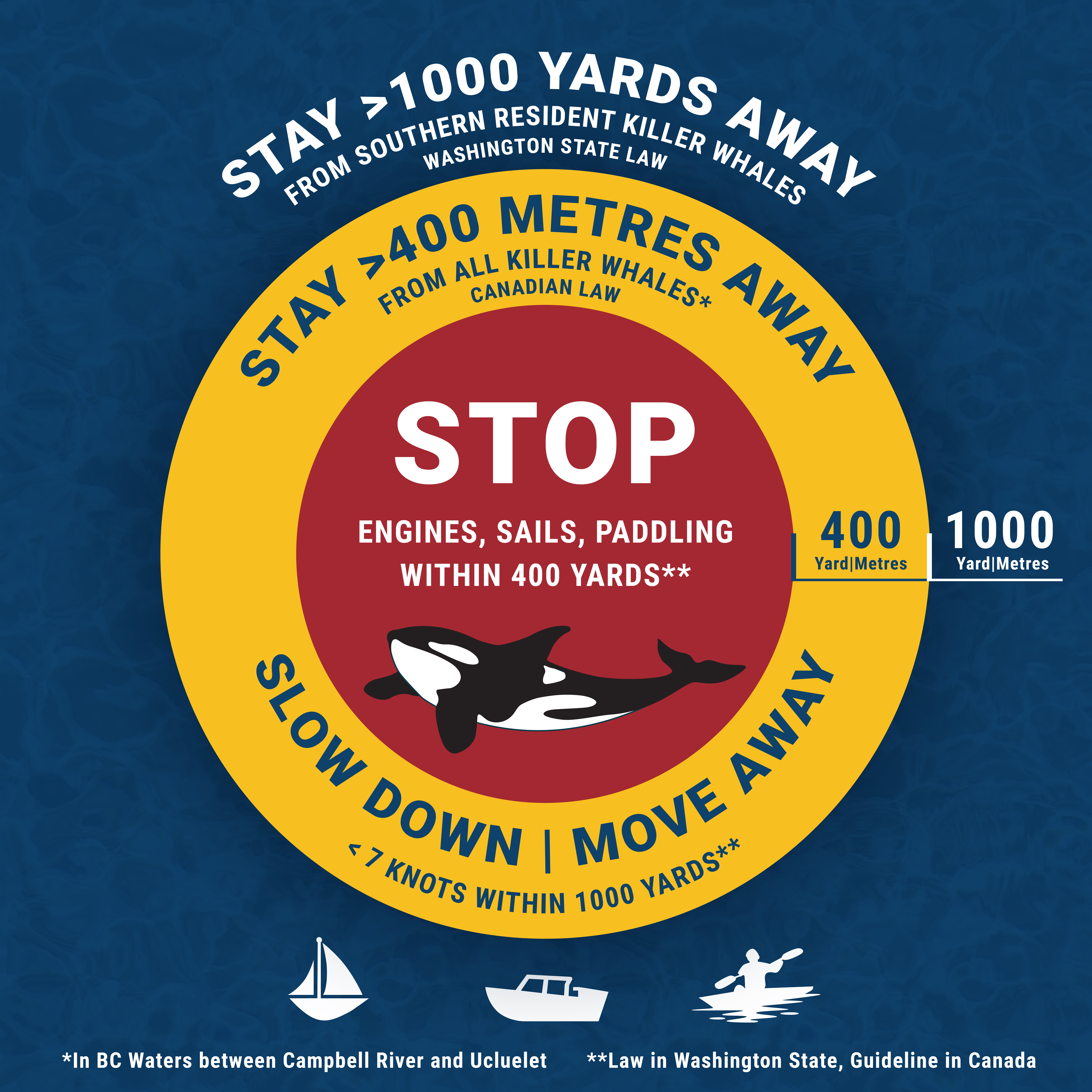
What You Need to Know
The Laws
Washington State
- Boaters must stay 1,000 yards* from Southern Resident killer whales.
- Boaters must go slow (<7 knots) within ½ mile of Southern Resident killer whales.
- Boaters must disengage engine(s) if Southern Resident killer whales appear within 400 yards.
- Boaters must stay 200 yards from other killer whales (Bigg’s/Transient killer whales).
- Boaters must not park in the path within 400 yards of other killer whales (Bigg’s/Transient killer whales)
Boaters should stay 100 yards from all other marine mammals (e.g. humpback whales, gray whales, sea lions and seals), and 200 yards from baleen whales resting or with a calf.
NOTE: It can be difficult to determine different types of killer whales, especially at a distance when you’re underway. When in doubt, err on the side of caution, treat them as endangered, and follow the appropriate regulations and guidelines.
*There are some areas in the Salish Sea where navigable channels are narrower than 1,000 yards. If you encounter Southern Resident killer whales and you are greater than 400 yards away from the whales, you can motor slowly (under 7 knots) away and out of their path of travel. If you are closer than 400 yards, you must disengage your engine(s) and wait for the whales to pass.
Learn more about Washington State Regulations and United States Federal Regulations.
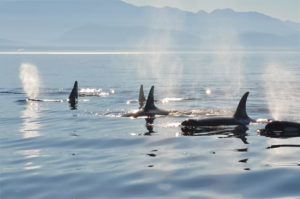
Canada
- Boaters must stay 400 metres away and may not position a vessel in the path of killer whales in southern BC coastal waters between Campbell River and just north of Ucluelet until May 31, 2025, as per the Interim Order enacted under the Canada Shipping Act. Vessels with a purple ‘Authorized Vessel’ (AV) flag are allowed to be closer to non-Southern Resident killer whales. Do not follow them. Learn more here.
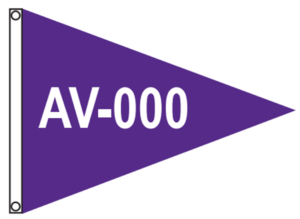
- Boats must stay 200 metres from all killer whales in other Canadian Pacific waters and from all whales, dolphins or porpoises if they are resting or with a calf.
- Boats must stay 100 metres from all other whales, dolphins and porpoises in Canadian Pacific waters.
- Drones can disturb marine mammals, so are discouraged for viewing marine mammals unless appropriate permits are obtained.
- Area-based fishing closures are in effect for recreational and commercial salmon in key Southern Resident Killer Whale foraging areas in Swiftsure Bank, Strait of Juan de Fuca, southern Gulf Islands and mouth of the Fraser River.
The Guidelines
Applies to all whales, porpoises, dolphins, seals, sea lions, any animal hauled out and nesting birds.
1. KNOW BEFORE YOU GO. Educate yourself on local marine life and regulations before getting underway.
2. BE ALERT and CAUTIOUS on the water. Have your family and friends help to scan for nearby marine life, especially in areas with known or suspected marine wildlife activity, or in narrow or tight areas of navigation.
3. LOOK IN ALL DIRECTIONS and ALWAYS GO SLOW (<7 knots) when in the vicinity of any marine wildlife. If you suspect but aren’t certain marine wildlife are near, slow to a stop and assess the situation.
4. PLACE ENGINE into neutral and allow all animals space to pass if they approach your vessel or surface within the allowable distance.
5. BE PREPARED to move away or shut down if nearby animals change speed and/or direction.
6. DO NOT position your vessel in front or behind wildlife.
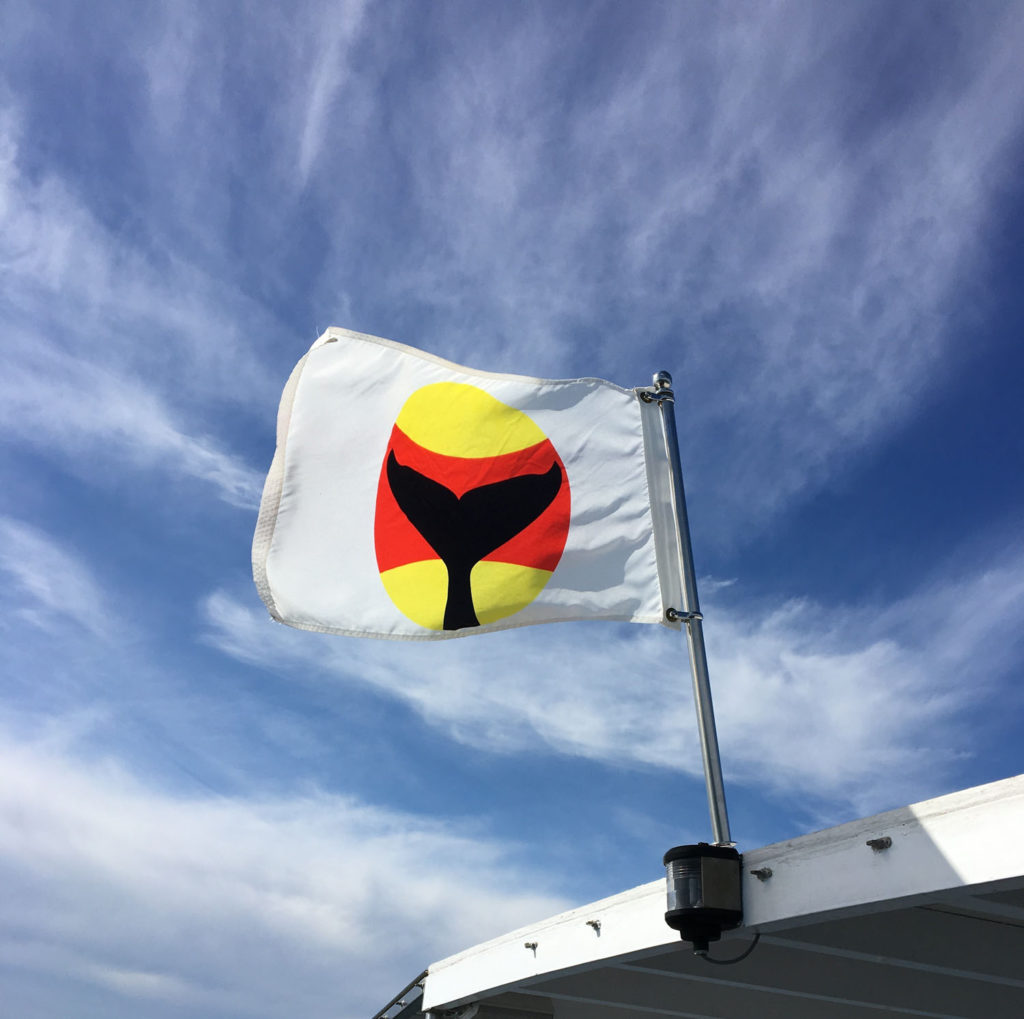
Whale Warning Flags Indicate
- Whales are in the vicinity.
- Vessels should slow down and be prepared to disengage engine or change course.
- Turn off fishfinders and depth sounders.
Learn more about the Whale Warning Flag and other flags you might see out on the water.
Get your own flag here for US boaters and here for CAN boaters.
7. STAY on the OFFSHORE side of all wildlife to lessen disturbance along the shoreline.*
8. AVOID moving through and disturbing groups of any marine animal. DISCOURAGE bow or stern riding by holding course and gradually reducing speed.
9. LIMIT any wildlife viewing time to 30 minutes or less to lessen cumulative impact of vessels on wildlife.
10. NEVER approach an animal in distress. Contact your local marine mammal response network to report a sick, stranded, entangled, or dead marine animal.
11. DID YOU SEE A WHALE? Help fellow boaters Be Whale Wise by flying your Whale Warning Flag and reporting your sighting to your local sightings network.
* Kayakers and paddlers should follow Kayak Education Leadership Program (K.E.L.P.) guidelines to stay INSHORE of wildlife, raft up, secure themselves, and stop paddling until whales have passed beyond regulation distance. Never paddle towards whales. Visit the K.E.L.P section on the Be Whale Wise website https://www.bewhalewise.org/kelp/ for more information.
The Zones
San Juan Island West Side Voluntary No-Go Zone
- Extends from Mitchell Point to Cattle Point
- One quarter (¼) nautical mile from the shore
- One half (½) nautical mile around Lime Kiln Point State Park
Click to DOWNLOAD a map.
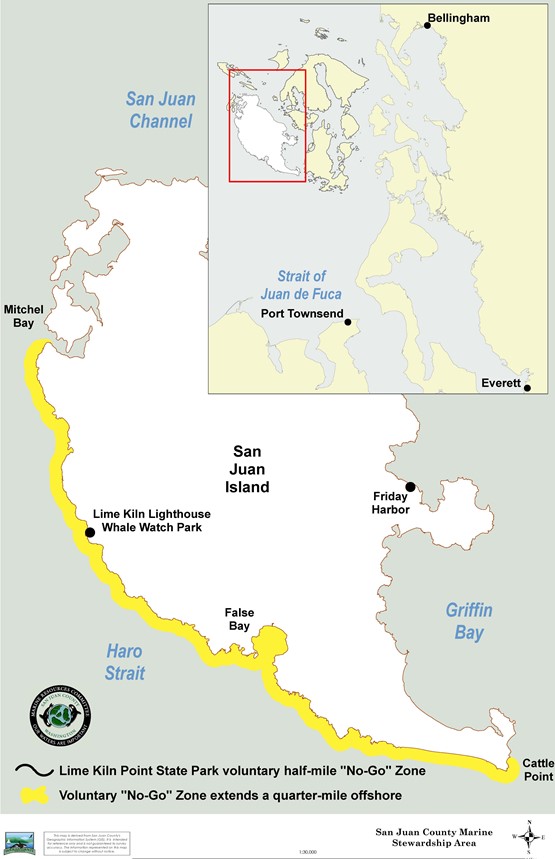
Canada Interim Sanctuary Zones
- Saturna Island
- Pender Island
Canadian Seasonal Slowdown Areas
- Swiftsure Bank
Area-Based Salmon Fishing Closures
- Mouth of the Fraser River
- Southern Gulf Islands
- Strait of Juan de Fuca
- Swiftsure Bank
Click on maps for coordinates and closure dates or visit https://www.canada.ca/southern-resident-killer-whales for more information.
Click to DOWNLOAD Canada’s poster.
Click to DOWNLOAD Canada’s brochure.
